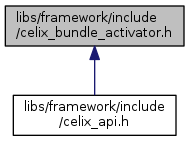|
Celix
2.2.0
An implementation of the OSGi specification adapted to C and C++
|
|
Celix
2.2.0
An implementation of the OSGi specification adapted to C and C++
|


Go to the source code of this file.
Macros | |
| #define | CELIX_GEN_BUNDLE_ACTIVATOR(actType, actStart, actStop) |
Functions | |
| celix_status_t | celix_bundleActivator_create (celix_bundle_context_t *ctx, void **userData) |
| celix_status_t | celix_bundleActivator_start (void *userData, celix_bundle_context_t *ctx) |
| celix_status_t | celix_bundleActivator_stop (void *userData, celix_bundle_context_t *ctx) |
| celix_status_t | celix_bundleActivator_destroy (void *userData, celix_bundle_context_t *ctx) |
| #define CELIX_GEN_BUNDLE_ACTIVATOR | ( | actType, | |
| actStart, | |||
| actStop | |||
| ) |
This macro generates the required bundle activator functions for C. This can be used to more type safe bundle activator entries.
The macro will create the following bundle activator functions:
| type | The activator type (e.g. 'struct shell_activator'). |
| start | the activator actStart function with the following signature: celix_status_t (*)(<actType>*, celix_bundle_context_t*). |
| stop | the activator actStop function with the following signature: celix_status_t (*)(<actType>*, celix_bundle_context_t*). |
| celix_status_t celix_bundleActivator_create | ( | celix_bundle_context_t * | ctx, |
| void ** | userData | ||
| ) |
Called when this bundle is started so the bundle can create an instance for its activator. The framework does not assume any type for the activator instance, this is implementation specific. The activator instance is handle as a void pointer by the framework, the implementation must cast it to the implementation specific type.
| ctx | The execution context of the bundle being started. | |
| [out] | userData | A pointer to the specific activator instance used by this bundle. |
| celix_status_t celix_bundleActivator_destroy | ( | void * | userData, |
| celix_bundle_context_t * | ctx | ||
| ) |
Called when this bundle is stopped so the bundle can destroy the instance of its activator. In general, this method should undo the work that the bundleActivator_create() function initialized.
This method must complete and return to its caller in a timely manner.
| userData | The activator instance to be used. |
| ctx | The execution context of the bundle being stopped. |
| celix_status_t celix_bundleActivator_start | ( | void * | userData, |
| celix_bundle_context_t * | ctx | ||
| ) |
Called when this bundle is started so the Framework can perform the bundle-specific activities necessary to start this bundle. This method can be used to register services or to allocate any resources that this bundle needs.
This method must complete and return to its caller in a timely manner.
| userData | The activator instance to be used. |
| ctx | The execution context of the bundle being started. |
| celix_status_t celix_bundleActivator_stop | ( | void * | userData, |
| celix_bundle_context_t * | ctx | ||
| ) |
Called when this bundle is stopped so the Framework can perform the bundle-specific activities necessary to stop the bundle. In general, this method should undo the work that the bundleActivator_start() function started. There should be no active threads that were started by this bundle when this bundle returns. A stopped bundle must not call any Framework objects.
This method must complete and return to its caller in a timely manner.
| userData | The activator instance to be used. |
| ctx | The execution context of the bundle being stopped. |
 1.8.11
1.8.11